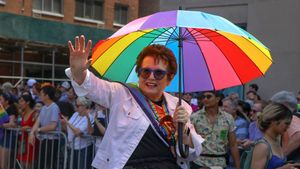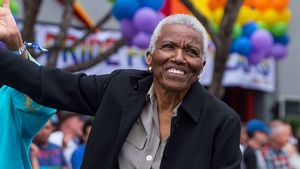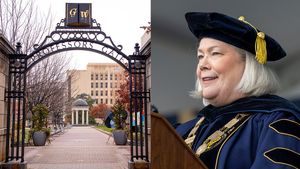Does your doctor know you're gay? Trans? Non-binary? Do they seem to treat you differently because of it? Or are you too nervous to even tell them? Fear of discrimination doesn't just isolate queer people, it can even make them wary of seeking out the basic needs of self-care. And for many of us, having a doctor, therapist, or even personal trainer who's queer or definitively queer-friendly could make a massive difference in our lives.
Lighthouse, a rapidly growing new startup, is addressing these precise issues and helping to solve these problems. Co-founded by gay therapist Nick Fager--who runs the LGBTQ division at Manhattan's Kull Initiative for Psychotherapy, and was previously featured in OUT for his popular therapy group Grindr'ed Down--Lighthouse (www.lighthouse.lgbt) officially launched in October for queer people in New York City, and will soon be expanding to other cities across the country.
Related | This New York Therapy Group is Helping Gay Men Kick the Apps
Along with his business partner and co-founder Sahir Iqbal, Fager, who's also the man behind the popular Instagram account @gaytherapy, has amassed a vast assortment of physicians, dentists, therapists, surgeons, trainers, and even chiropractors to be a part of the Lighthouse network. And here, Fager sounds off on how the service started, how it's doing, and why it's essential for our community.
OUT: What was the impetus for Lighthouse? What did you encounter in your personal and professional life that prompted you to form the startup?
Nick Fager: In my personal life, I experienced a lot of discrimination in healthcare settings growing up and into my adult life. One doctor stopped shaking my hand when he found out I was gay. One of my therapists told me I was going through a phase. Their words and actions held such power over me given the positions they were in, and I ended up going through a very long period of suffering that could have been avoided if I was affirmed and normalized. These experiences made me realize the crucial role that doctors and therapists play in our community, as they are often the first people that we're truly honest with. Their reactions and decisions in the wake of those honest moments can drastically alter the course of our lives. I became an LGBTQ specialized psychotherapist because I wanted to have the privilege of sitting across from people in those moments. Once I started gaining a following with @gaytherapy, I realized there was a much bigger need here than one I could address alone. People were constantly reaching out to me looking for queer-friendly therapists, doctors, dentists, surgeons, personal trainers, and more. So I started calling all the top LGBTQ health and wellness professionals in the city and pitched them my idea, and almost every one them said something like, "Why doesn't this exist yet? Sign me up."
What are some specific stories you've heard from LGBTQ people who've experienced discrimination when seeking care?
Research shows that over 50 percent of LGBTQ people have experienced discrimination in healthcare settings. It is continuously shocking to me the amount of stories I hear about discrimination happening today, in 2017, in New York City. I hear stories of doctors refusing to treat trans folks, dentists turning away HIV-positive people, and providers of all kinds being completely uninformed about things like PrEP, hormone therapy, and anal pap smears. I hear stories about therapists who are judgmental about things like open relationships, or kink, and actually make those things the presenting problems instead of what the client is actually coming in to discuss. And sometimes it's much more subtle--a small comment that invalidates our experience, repeatedly misgendering a trans patient, or even just a look that communicates disgust or disapproval can have a huge effect. The biggest concern is that when someone experiences discrimination in a healthcare setting, they are three times more likely to delay follow-up care. Since we don't feel safe, we stop getting the care we need, and problems exacerbate. The simple reality is that healthcare is not a one-size-fits-all industry, and for far too long, we've all been getting our care according to a heterosexual, cisgender model that doesn't take our specific needs into account. When you go to Lighthouse, you have access to a network of providers who have devoted their careers to helping the LGBTQ community.

Courtesy of Lighthouse/Nick Fager
Lighthouse promises to provide queer people with "LGBTQ identifying or affirming" doctors and specialists. How does that vetting process work? How is it determined if someone is LGBTQ affirming?
The vetting process begins with an application that all of our providers fill out which includes LGBTQ experience, training, certifications, and education. That gets reviewed by our team of queer healthcare providers, and if we believe it is a match, we follow up with a phone call where we ask specific questions based on profession, such as if they are a primary care provider, or if they prescribe PEP and PrEP. If they are therapist, we ask them to tell us about how they deal with common issues in the community, such as internalized homophobia or transphobia. From there, we verify that their intake forms are inclusive of all gender identities and sexual orientations so that community members feel safe and affirmed from the moment they walk in the door. Once we've gathered all of this info, we feel comfortable either accepting the professional onto our platform or referring them to additional LGBTQ training.
A lot of people--queer and otherwise--are concerned about possibly losing their healthcare or health insurance, and generally facing more discrimination, under the shadow of the current administration. How that factored into the formation of Lighthouse?
Lighthouse really came to fruition the day after the election. We realized that safe spaces were going to become harder to find and the insurance market was going to become harder to navigate. We wanted to create a space where people didn't have to worry about the oppressive system and could simply take care of themselves and better themselves. Nothing is more important during times like these than self-care.
Lighthouse is new, but currently up and running in New York City. What has some of the feedback been from patients and clients who've been using the service?
The feedback has been pretty fantastic so far. We haven't had any reports of discrimination yet and generally, people are finding providers that are meeting their specific needs. We've had quite a few trans people reach out to us to say that they are actually starting the process of transitioning because they finally found a provider they feel safe enough to go through that with. We've had gay couples who have decided to have a kid because they finally found a doctor who helped them navigate their options. We've had queer people of all ages write us saying that they are changing careers and pursuing their passions because they finally feel supported by the right therapist. At the end of the day, our mission is to not just help people avoid discrimination, it's to help people become their authentic selves and thrive in the world. All of the stories of change and empowerment are energizing us to make our service even better.
Your goal is to take Lighthouse nationwide. How do you plan to do that, and when can non-New Yorkers expect to find Lighthouse services in their towns?
We want to make sure we have perfect the model here in New York. There's a lot of nuance to creating a resource for the whole LGBTQ community. But we'll be launching in other queer meccas next year--like San Francisco, Los Angeles, Chicago, and Atlanta--and spreading out into smaller cities and rural areas from there. In parts of the country where there are no affirming resources, we will be developing our own. If anyone lives in a city where we haven't launched yet, they should check out our blog (blog.lighthouse.lgbt), where top LGBTQ providers across the country are writing regular content for us about specific queer issues.
If you had to choose one thing to say to prospective Lighthouse clients, what would it be?
No matter what is happening in your life right now, you need to be getting the right care. If our physical and mental health are in the right hands, we can handle whatever might be going on in our external world. Maybe there is that thought in the back of your mind that you've been meaning to find a new doctor or you've been wanting to start therapy for the first time, and maybe one of your reasons or not doing is that you think it's hard to find the right person, and you don't want to go through that vulnerable process. Lighthouse solves that problem--it lets queer people have one less barrier to taking control of their health.
Find Lighthouse online at www.Lighthouse.lgbt
Follow Lighthouse on Instagram @lighthouselgbt







































































